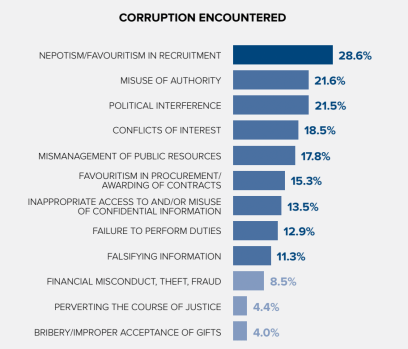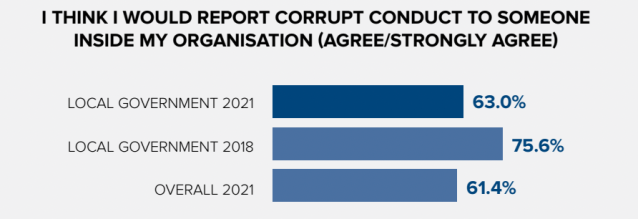Nepotism and political interference are viewed as the biggest corruption risks for councils in South Australia, according to a survey of the state’s local government officers.
The findings, contained in the South Australian ICAC’s recent Local Government Public Integrity Insights report, are based on the responses of 1,114 of the state’s 10,700 local government employees who were surveyed over November and December 2021.

The local government report follows the publication of a whole of government report in June.
“Nepotism and favouritism were considered the most prevalent corruption risks within councils,” Commissioner Anne Vanstone QC writes.
“The perception of preferential treatment, including nepotism and favouritism in recruitment, promotion and other career opportunities, continues to be seen to be a problem across public administration, including within the local government sector.
“It might be that decisions are merit-based, however, the rationale behind decisions also needs to be communicated and explained.”
Participants in the survey also raised concerns about potential corruption relating to procurement and contracts.

Vulnerabilities
However, the surveys indicate that corruption is considered to be less of a problem within the local government sector than in the general public sector, with 43 per cent of local government employees identifying their workplace as vulnerable to corruption compared to 59 per cent of those in general administration.
Fifteen per cent of local government said they’d encountered corrupt behaviour, compared to 23 per cent overall, and almost a third of local government officers agreed that corruption was overlooked ‘depending on who you are’.
Senior managers in local government were also ‘significantly’ less likely to perceive their workplace to be highly or extremely highly vulnerable to corruption.
Commissioner Vanstone said the perceptions of levels of corruption had decreased since the first Public Integrity Survey in 2018, and respondents also appeared less likely to blow the whistle on corruption today than they were four years ago.

Fear of repercussions
The survey also that not everyone in the local government sector felt safe reporting corruption.
Men, officers in non-leadership roles, and longer-term employees were most likely to worry about victimisation if they reported corruption, including fear they’d lose their job, be in trouble with colleagues or not be treated fairly.
The survey also shows that elected members are perceived to be at risk of misusing confidential information, engaging in political interference and not managing conflicts of interest.
“The qualitative comments suggest that elected members do not always understand how to identify and manage conflicts of interest,” the report says.
Many of the comments related to concerns about elected members having too much influence over operational matters and interfering in day to day operations, and being more concerned about getting re-elected than working for the interests of the community.
Commissioner Vanstone QC said Certain corruption risks might be more prevalent in regional councils, and reflect the challenges faced by public officers working in small, close-knit communities,” and that it may be “more difficult for public officers in regional councils to speak up about potential corruption.”





Leave a Reply